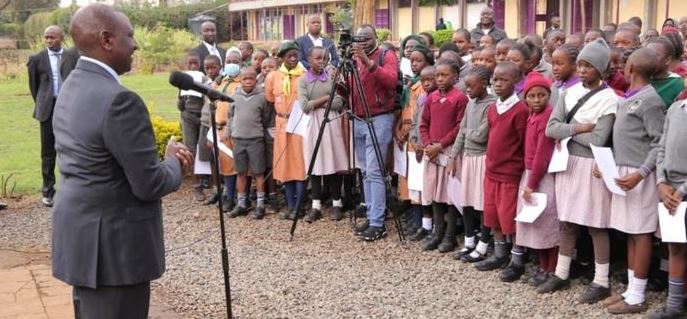Anxiety filled the air as the anticipated moment approached—the unveiling of the final Competency-Based Curriculum (CBC) changes by President William Ruto. Multiple sources with insider information on the forthcoming education reforms hinted that the unveiling would take place in the second week of July. The news sent waves of speculation and concern throughout the nation.
The Kenya Kwanza regime, which had come into power in September 2022, had acknowledged the financial burden the previous curriculum had placed on parents and the government. In an effort to address these concerns, President Ruto tasked the Presidential Working Party on Education Reforms with the responsibility of delving into the comprehensive and multifaceted cost implications of the CBC.
Initially, Ruto's administration had contemplated a complete overhaul of the CBC, which had been launched by former President Uhuru Kenyatta. However, extensive consultations made it clear that introducing an entirely new system would disrupt students and squander taxpayers' money. Consequently, the decision was made to stick with the CBC, albeit with some necessary adjustments.
President Ruto, echoing the sentiments of his predecessor and the late former Education Cabinet Secretary George Magoha, affirmed the importance of the CBC in improving the educational landscape and equipping learners to face modern challenges. However, he recognized the need for modifications to the curriculum.
In February 2023, Professor Raphael Munavu, heading a task force dedicated to the CBC changes, presented the report to President Ruto at State House. The stage was now set for the eagerly awaited unveiling, scheduled to take place later in the month.
The report contained several key changes that had been proposed by the task force. Among them was the recommendation to abolish the categorization of schools into national, extra-county, county, and sub-county institutions. Instead, the task force advocated for a system that identified schools based on career pathways, allowing students to choose schools that aligned with their career aspirations.
Another significant recommendation was the abolishment of the Kenya Certificate of Primary Education (KCPE), the primary school examinations that had long been a deciding factor in a student's educational journey. Stakeholders pushed for its phased-out completion by November 2023. Moving forward, students would be able to pursue specialization areas in Arts and Sport Science, Social Sciences, or Science, Technology, Engineering, and Mathematics (STEM).
The STEM pathway, in particular, offered options for students to pursue pure, applied, technical, and engineering sciences, as well as career and technology studies. Indimuli Kahi, the chairman of the Kenya Secondary School Head Teachers Association, revealed that 60 percent of learners in a school should be enrolled in STEM, while 25 percent would focus on social sciences, and the remainder on arts.
The task force also recommended that the Kenya National Examination Council (KNEC) be renamed the Kenya National Assessment Council (KNAC), reflecting the curriculum's emphasis on assessments rather than traditional examinations.
In terms of structure, the report proposed that junior secondary schools (Grade 7, Grade 8, and Grade 9) be integrated into existing primary schools, and that the Grade 6 assessment should no longer be used for learner placement. Additionally, the Ministry of Education was urged to reduce the number of subjects for Junior Secondary School students, aiming for a more streamlined approach.
The changes didn't stop there. The task force proposed a demotion of headteachers overseeing primary schools hosting Junior Secondary Schools (JSS), with plans to merge preschools, primary schools, and JSS under a single principal. This move aimed to centralize accountability for government-disbursed funds by transferring the appointing power from the Teachers Service Commission (TSC) to the Ministry of Education.
Addressing concerns raised by parents, the task force recommended that teachers who wished to continue teaching in primary and secondary schools undergo a one-year retraining program. This mandatory program would ensure that teachers aligned with the CBC changes and adhered to the set guidelines, mitigating any potential issues that had arisen in the past.
As the day of the official unveiling drew closer, stakeholders across the nation braced themselves for the final CBC changes. The anxiety was palpable, as the education sector and the general public awaited the official announcement from President Ruto. It was a critical juncture for the future of education in Kenya, with hopes that the modifications would address the concerns of stakeholders and pave the way for an improved curriculum that would better serve the nation's learners.

